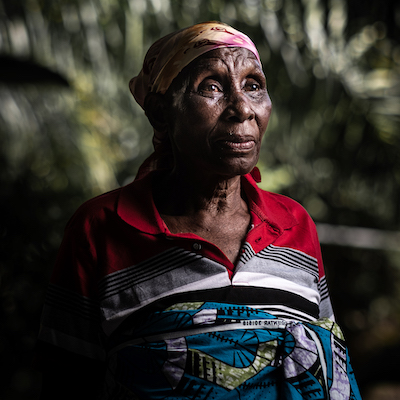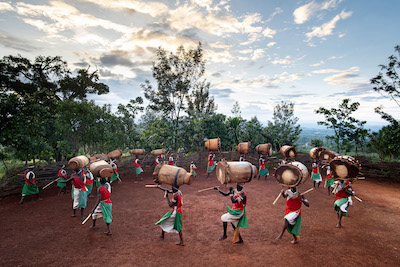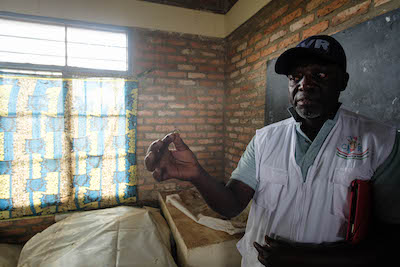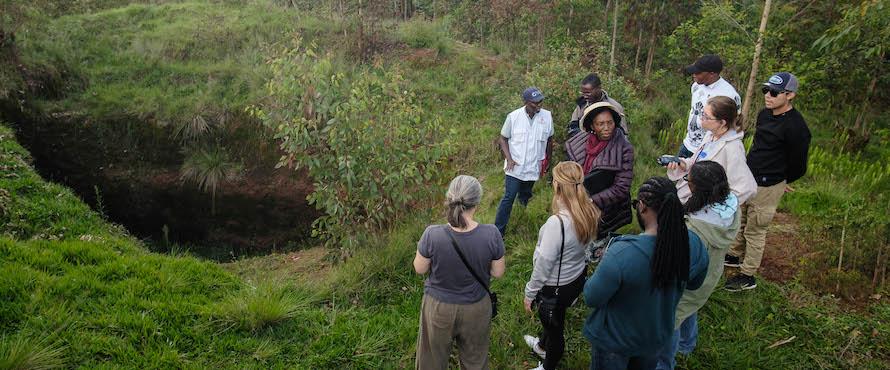Northeastern Illinois University’s Genocide and Human Rights in Africa and the Diaspora (GHRAD) Center will host the 10th annual GHRAD Conference beginning at 9:00 a.m. March 7-8 in Alumni Hall. The conference will also be streamed via Zoom. Advance sign-up is requested to receive the Zoom link. The conference schedule is available.
This year, there will also be a special workshop day for educators at 10:00 a.m. March 9 in Lech Walesa Hall, Room LWH 2046. Continuing Professional Development Units are available for Chicago Public Schools (CPS) teachers. It will center practical ideas for embedding diverse understanding of global genocides into schools. The workshop will be led by CPS educator and filmmaker Sarah Falkiner and artist, children’s book author and youth development practitioner Senyah Haynes. Advance sign-up is recommended.
Additionally, Northeastern will open the “1972 Burundi Genocide - Oral Histories” archive alongside a photography exhibit, “Echoes of Silence,” through March 14. The exhibit features portraits of survivors of the genocide as well as landscape imagery and other photographs from the GHRAD Center’s study abroad trip in December 2023. The oral history archive about the 1972 genocide in Burundi, East Africa, is the first of its kind to be housed in an institution of higher learning.
The conference, workshop and exhibit will be held on the University’s Main Campus, 5500 N. St. Louis Ave. in Chicago. All events are free and open to the public.

Cecile Nskerabandya witnessed militia forcefully take all the educated male members of her community out of their homes in Buhonga, a small village tucked away in Burundi’s mountains. Her brother and father were killed during the 1972 genocide in Burundi. Photo by Viktor Gerasimovski.
Northeastern Professor and Coordinator of Teaching English to Speakers of Other Languages Jeanine Ntihirageza serves as the Director of the GHRAD Center. She is a survivor of the 1972 genocide in Burundi. It is estimated that between 150,000 and 300,000 people were killed, the majority of them being Hutu people, like Ntihirageza. She shared part of her story with the BBC in 2022, and continues to educate people about the genocide not just at Northeastern, but also through conferences and presentations across the globe.
“As a survivor of the genocide, I never imagined that I could get to this day,” Ntihirageza said. “When a small group of us — Drs. Chi Eze, Al Frankowski, Olivia Perlow and TY Okosun, with the encouragement of former Provosts Drs. Wamucii Njogu and Larry Frank — organized the first conference, we had no intention of planning other conferences. However, at the encouragement of the University community, we kept going. It’s been an incredible journey for me personally and professionally.”
This year’s conference theme is “The Intersection of Gender, Sexual Violence and Genocide in Africa and Beyond.” It will cover many issues relating to genocide with a special focus on the role of gender in Africa and the Diaspora.
More than a dozen national and international speakers are scheduled to present during the conference. The conference’s keynote address will be held at 1:00 p.m. March 7 and will be delivered by lawyer, human rights advocate and author Ewelina U. Ochab, Ph.D. Ochab is also the co-founder of the Coalition for Genocide Response and is part of the International Bar Association’s Human Rights Institute.
Northeastern student Viktor Gerasimovski (M.A. Human Resource Development) traveled to Burundi with Ntihirageza and others from Northeastern’s GHRAD Center last December. He and the group of students, faculty and staff recorded more than 150 testimonials of genocide survivors, which will be included in the “1972 Burundi Genocide - Oral Histories” archive. Gerasimovski took hundreds of photographs during the trip, many of which will be part of “Echoes of Silence.”

Gishora Drummers, the most renowned group in the country, perform traditional Burundian dances in December 2023. Photo by Viktor Gerasimovski.
“‘Echoes of Silence" is not merely a collection of photographs; it is a testament to the resilience of the human spirit in the face of unimaginable darkness,” Gerasimovski said. “It is a tribute to the survivors of the Burundian genocide of 1972, whom I have come to regard as heroes for their bravery in sharing their truths with us, so that I may, in turn, share them with the world through my lens.”
The exhibit will be Gerasimovski’s first solo exhibition of photography. It will be held on the first floor of the Ronald Williams Library from March 5-14. There will be a special opening of “Echoes of Silence” from 7:00-9:00 p.m. March 6 and a panel discussion about the photographs and oral history archive from 12:45-1:30 p.m. March 8 in Alumni Hall.
Gerasimovski has been living in Chicago for the past nine years, but is originally from Macedonia. He came to Northeastern after studying in Europe and said he cherishes the experience of being able to learn, not only in the U.S., but in different environments than what he was used to, especially by traveling to Burundi.
“This has been by far one of the most impactful experiences of my life,” said Gerasimovski, who currently serves as a graduate assistant for the GHRAD Center. “It was my first time in Africa and in Burundi. The people were very kind. It really struck me how much horror can be in a history, but the people have so much strength. The landscapes of Burundi are also stunning and I wanted to try to illustrate the vibrance of the landscapes and people through my photography.”
Ntihirageza noted the visit to Burundi was important because students and faculty were able to collaborate and establish firsthand personal and scholarly experiences during the testimony collection.
“They got to visit the places where the genocide happened,” Ntihirageza said. “That can be powerful, as evidenced in students’ presentations for the annual GHRAD conference.”
The “1972 Burundi Genocide - Oral Histories” collection will be permanently housed by the NEIU Libraries as part of NEIU Digital Commons.
“The 1972 genocide of Hutu in Burundi was silenced by the Tutsi-dominated government,” Ntihirageza said. “This oral history archive is giving victims and survivors a much needed voice inside and outside Burundi. I am a living example of how publicly sharing survivor testimonies can help engage on a healing journey, and this is an opportunity for them to engage on a healing journey, too.”
The oral histories were recorded on video and translated by an English interpreter as the interviews took place. Ntihirageza hopes the archives will help more people understand the 1972 Burundi genocide, connect Burundian youth with their historical past to understand and mend generational trauma, and allow scholars and students to have a direct connection to Hutu, Tutsi and other survivors of genocide in Burundi and the African Great Lakes before the survivors pass away.

Burundi established a Truth and Reconciliation Commission (TRC) in 2014 to investigate human rights violations in the country after it gained independence in 1962. Here, a representative from the TRC holds a ring retrieved from a mass grave in Muzenga/Bururi, Burundi. Photo by Viktor Gerasimovski.
“Documenting these stories serves as a powerful and salient historical and educational tool that must be highlighted and discussed in the larger academic and international community,” Ntihirageza said. “It is my hope that these stories will serve as an effective vehicle to shed light on the long-lasting emotional and psychological effects of genocide and contribute to educating the general public on how we can prevent genocide in the future.”
Ntihirageza plans to collect more oral histories and add them to the archives in the future.
“We owe it to the victims and the survivors,” Ntihirageza said. “By continuing the conversations, we may help stop generational trauma, which has become rampant after mass atrocities, in its tracks. It is my hope that the more we study genocides and other mass atrocities as well as types of human rights violation, we will contribute to their prevention.”
Top photo: Jeanine Ntihirageza (group center) with Northeastern students, faculty and staff near a mass grave in Burundi during a study abroad trip in December 2023. Photo by Viktor Gerasimovski.








